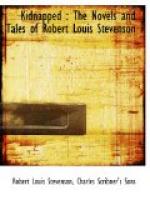It never occurred to him to doubt me, for a Highlander is used to see great gentlefolk in great poverty; but as he had no estate of his own, my words nettled a very childish vanity he had.
“My name is Stewart,” he said, drawing himself up. “Alan Breck, they call me. A king’s name is good enough for me, though I bear it plain and have the name of no farm-midden to clap to the hind-end of it.”
And having administered this rebuke, as though it were something of a chief importance, he turned to examine our defences.
The round-house was built very strong, to support the breaching of the seas. Of its five apertures, only the skylight and the two doors were large enough for the passage of a man. The doors, besides, could be drawn close: they were of stout oak, and ran in grooves, and were fitted with hooks to keep them either shut or open, as the need arose. The one that was already shut I secured in this fashion; but when I was proceeding to slide to the other, Alan stopped me.
“David,” said he—“for I cannae bring to mind the name of your landed estate, and so will make so bold as to call you David—that door, being open, is the best part of my defences.”
“It would be yet better shut,” says I.
“Not so, David,” says he. “Ye see, I have but one face; but so long as that door is open and my face to it, the best part of my enemies will be in front of me, where I would aye wish to find them.”
Then he gave me from the rack a cutlass (of which there were a few besides the firearms), choosing it with great care, shaking his head and saying he had never in all his life seen poorer weapons; and next he set me down to the table with a powder-horn, a bag of bullets and all the pistols, which he bade me charge.
“And that will be better work, let me tell you,” said he, “for a gentleman of decent birth, than scraping plates and raxing* drams to a wheen tarry sailors.”
Reaching.
Thereupon he stood up in the midst with his face to the door, and drawing his great sword, made trial of the room he had to wield it in.
“I must stick to the point,” he said, shaking his head; “and that’s a pity, too. It doesn’t set my genius, which is all for the upper guard. And, now” said he, “do you keep on charging the pistols, and give heed to me.”
I told him I would listen closely. My chest was tight, my mouth dry, the light dark to my eyes; the thought of the numbers that were soon to leap in upon us kept my heart in a flutter: and the sea, which I heard washing round the brig, and where I thought my dead body would be cast ere morning, ran in my mind strangely.
“First of all,” said he, “how many are against us?”
I reckoned them up; and such was the hurry of my mind, I had to cast the numbers twice. “Fifteen,” said I.
Alan whistled. “Well,” said he, “that can’t be cured. And now follow me. It is my part to keep this door, where I look for the main battle. In that, ye have no hand. And mind and dinnae fire to this side unless they get me down; for I would rather have ten foes in front of me than one friend like you cracking pistols at my back.”




